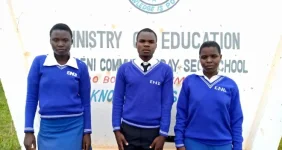More than 600 secondary school students in Mzimba South are receiving help through a bursary program funded by the Constituency Development Fund. The program supports students who might struggle to continue their education and helps reduce school dropout rates.
Education officials reported that 615 students 277 boys and 338 girls—from various public secondary schools received bursaries covering tuition and school supplies. Local communities have praised Members of Parliament for dedicating at least five percent of the fund to educational support.
At Endindeni Community Day Secondary School, Head Teacher Sphiwe Mbeya explained that 18 students have benefited from the program. Eleven girls and seven boys are seeing better academic performance and fewer chances of leaving school early. Mbeya emphasized the importance of supporting girls who often face more challenges in continuing their education.
Sixteen-year-old Chikondi Ngoma from Chibula Village shared how the bursary prevented her from dropping out. She can now pursue her dream of becoming a teacher. Seventeen-year-old Princess Mphande, a Form Four student, noted how the bursary gave her more study time and improved her grades.
Mightwel Mtonga from the Office of Social Welfare praised the program as a powerful way to break the poverty cycle in rural areas. District Commissioner Rodney Simwaka commended the collaboration between Members of Parliament and the local council.
Members of Parliament Chambulanyina Jere, Marther Mzomera Ngwira, and Jacob Hara celebrated the district council's successful program implementation. They described the bursary initiative as a model of effective local governance that directly supports young people's educational opportunities.
The bursary program demonstrates a community-wide commitment to education. By supporting underprivileged students, the initiative helps young people continue their studies and pursue their future goals. Students like Chikondi and Princess can now focus on learning and building their potential.
Local leaders and community members see the program as a critical investment in the region's future. By removing financial barriers to education, they are helping students overcome challenges and create opportunities for themselves and their families.
Education officials reported that 615 students 277 boys and 338 girls—from various public secondary schools received bursaries covering tuition and school supplies. Local communities have praised Members of Parliament for dedicating at least five percent of the fund to educational support.
At Endindeni Community Day Secondary School, Head Teacher Sphiwe Mbeya explained that 18 students have benefited from the program. Eleven girls and seven boys are seeing better academic performance and fewer chances of leaving school early. Mbeya emphasized the importance of supporting girls who often face more challenges in continuing their education.
Sixteen-year-old Chikondi Ngoma from Chibula Village shared how the bursary prevented her from dropping out. She can now pursue her dream of becoming a teacher. Seventeen-year-old Princess Mphande, a Form Four student, noted how the bursary gave her more study time and improved her grades.
Mightwel Mtonga from the Office of Social Welfare praised the program as a powerful way to break the poverty cycle in rural areas. District Commissioner Rodney Simwaka commended the collaboration between Members of Parliament and the local council.
Members of Parliament Chambulanyina Jere, Marther Mzomera Ngwira, and Jacob Hara celebrated the district council's successful program implementation. They described the bursary initiative as a model of effective local governance that directly supports young people's educational opportunities.
The bursary program demonstrates a community-wide commitment to education. By supporting underprivileged students, the initiative helps young people continue their studies and pursue their future goals. Students like Chikondi and Princess can now focus on learning and building their potential.
Local leaders and community members see the program as a critical investment in the region's future. By removing financial barriers to education, they are helping students overcome challenges and create opportunities for themselves and their families.












